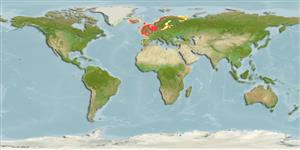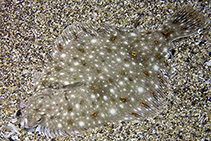Pleuronectes platessa Linnaeus, 1758
European plaice
把你的觀察加入 Fish Watcher
| Native range | All suitable habitat | Point map | Year 2050 |

|
| This map was computer-generated and has not yet been reviewed. |
| Pleuronectes platessa AquaMaps Data sources: GBIF OBIS |
上傳你的 相片 和 影像
Pictures | Videos | Stamps, coins, misc. | Google 影像Pleuronectes platessa
Picture by Greenfield, J.
Pictures | Videos | Stamps, coins, misc. | Google 影像Pleuronectes platessa
Picture by Greenfield, J.
Latvia country information
Common names:
Jūras zeltplekste
Occurrence: native
Salinity: marine
Abundance: common (usually seen) | Ref: Winkler, H.M., K. Skora, R. Repecka, M. Ploks, A. Neelov, L. Urho, A. Gushin and H. Jespersen, 2000
Importance: | Ref:
Aquaculture: | Ref:
Regulations: | Ref:
Uses: no uses
Comments:
National Checklist:
Country Information: https://www.cia.gov/library/publications/resources/the-world-factbook/geos/lg.html
National Fisheries Authority:
Occurrences: Occurrences Point map
Main Ref: Winkler, H.M., K. Skora, R. Repecka, M. Ploks, A. Neelov, L. Urho, A. Gushin and H. Jespersen, 2000
National Database: Fish of Latvia
Occurrence: native
Salinity: marine
Abundance: common (usually seen) | Ref: Winkler, H.M., K. Skora, R. Repecka, M. Ploks, A. Neelov, L. Urho, A. Gushin and H. Jespersen, 2000
Importance: | Ref:
Aquaculture: | Ref:
Regulations: | Ref:
Uses: no uses
Comments:
National Checklist:
Country Information: https://www.cia.gov/library/publications/resources/the-world-factbook/geos/lg.html
National Fisheries Authority:
Occurrences: Occurrences Point map
Main Ref: Winkler, H.M., K. Skora, R. Repecka, M. Ploks, A. Neelov, L. Urho, A. Gushin and H. Jespersen, 2000
National Database: Fish of Latvia
Common names from other countries
分類 / Names 俗名 | 同種異名 | Catalog of Fishes(屬, 種) | ITIS | CoL | WoRMS | Cloffa
Teleostei > Pleuronectiformes (Flatfishes) 鰈形目 (Flatfishes) > Pleuronectidae (Righteye flounders) 鰈科 (Righteye flounders) > Pleuronectinae
Etymology: Pleuronectes: Greek, pleura = side, ribe + Greek, nekton = swimmer (Ref. 45335).
More on author: Linnaeus.
Etymology: Pleuronectes: Greek, pleura = side, ribe + Greek, nekton = swimmer (Ref. 45335).
More on author: Linnaeus.
Environment: milieu / climate zone / depth range / distribution range 生態學
海洋; 半鹹淡水 居於水底的; 海洋洄游的 (Ref. 51243); 深度上下限 0 - 200 m (Ref. 35388), usually 10 - 50 m (Ref. 35388). 溫帶; 2°C - 15°C (Ref. 5504); 72°N - 36°N, 47°W - 45°E
分布 國家 | FAO區域 | 生態系 | 發現紀錄 | Point map | 簡介 | Faunafri
Northern Sea. Reports from the Mediterranean Sea appear to be misidentifications of
P. flesus. It may have been present in some areas of the Mediterranean in the past, as a result of climatic changes related to the ice age, but at present times seem to be absent (Ref. 89040).
東北大西洋: 格陵蘭與挪威南至摩洛哥; 在地中海西部的西班牙與法國。 也已知來自白海 (參考文獻 4705) 與愛沙尼亞。 (參考文獻 33247)
東北大西洋: 格陵蘭與挪威南至摩洛哥; 在地中海西部的西班牙與法國。 也已知來自白海 (參考文獻 4705) 與愛沙尼亞。 (參考文獻 33247)
Length at first maturity / 大小 / 重量 / 年齡
Maturity: Lm 32.7, range 24 - 42 cm
Max length : 100.0 cm SL 雄魚/尚未辨別雌雄; (Ref. 4705); common length : 40.0 cm TL 雄魚/尚未辨別雌雄; (Ref. 3397); 最大體重: 7.0 kg (Ref. 173); 最大年齡: 50 年 (Ref. 173)
Max length : 100.0 cm SL 雄魚/尚未辨別雌雄; (Ref. 4705); common length : 40.0 cm TL 雄魚/尚未辨別雌雄; (Ref. 3397); 最大體重: 7.0 kg (Ref. 173); 最大年齡: 50 年 (Ref. 173)
簡短描述 檢索表 | 型態特徵 | 形態測量圖
背棘 (總數) : 0; 背的軟條 (總數) : 65 - 79; 臀棘: 0; 臀鰭軟條: 48 - 59. Smooth with small scales. Bony ridge behind the eyes. Upper side brown or greenish brown with irregularly distributed bright red or orange spots. The underside is white. Lateral line straight, slightly curved above pectoral fin. Dorsal fin reaching eye. More than 30 vertebrae.
平滑的具有小鱗片。 骨脊眼睛後面。 上側面褐色或綠褐色的有不規則的分佈鮮紅色或橘色斑點。 下面是白色的。 側線直線, 些微地在胸鰭上面彎曲了。 背鰭達到眼。 超過 30個脊椎骨。
平滑的具有小鱗片。 骨脊眼睛後面。 上側面褐色或綠褐色的有不規則的分佈鮮紅色或橘色斑點。 下面是白色的。 側線直線, 些微地在胸鰭上面彎曲了。 背鰭達到眼。 超過 30個脊椎骨。
Adults live on mixed bottoms, the older the deeper the occurrence; small individuals are usually seen on bathing beaches (Ref. 9988). Occurs on mud and sand bottom from a few meters down to about 100 m, at sea, estuaries and rarely entering freshwaters (Ref. 59043). Reported as resident intertidal species with homing behavior (Ref. 32612). Feed mainly on thin-shelled mollusks and polychaetes. Batch spawner (Ref. 51846). The most important flatfish for fisheries in Europe. Utilized fresh and frozen; eaten steamed, fried, boiled, microwaved and baked (Ref. 9988). Active at night in the very shallow water while day time is spent buried in the sand. Stationary for long periods, tagging experiments have shown that their spawning migrations can be long. Changes in the environmental conditions have been disadvantageous. Populations in Kattegat and Danish belts decreased in 1980's and early 1990's due to discharge of nutritive salts. Wadden sea is still an excellent nursery ground (Ref.35388).
成魚生活在混合底部,更老上那更深地發生。 小的個體通常關於沐浴海灘被見到。 (參考文獻 9988) 被記錄為.定居的潮間帶的種有歸巢的行為.(參考文獻 32612) 主要捕食細-有殼的軟體動物與多毛類動物。 分批產卵者.(參考文獻 51846) 為在歐洲的漁場最重要的比目魚。 生鮮使用與冷凍; 清蒸,油炸,煮沸, 微波.而且燒烤..(參考文獻 9988) 活躍的在晚上,在很淺的水域中,然而白天被花費埋藏在砂中。 靜止的長時期以來,附以籤條實驗已經顯示他們生殖迴游可能是長的。 在環境狀況方面的改變曾經不利的。 在 Kattegat 與丹麥的帶的族群在 1980 年代與 1990 年代早期中減少.由於有營養鹽的放電。 Wadden 海洋仍然是一個優良的育幼場。 (參考文獻 35388)
成魚生活在混合底部,更老上那更深地發生。 小的個體通常關於沐浴海灘被見到。 (參考文獻 9988) 被記錄為.定居的潮間帶的種有歸巢的行為.(參考文獻 32612) 主要捕食細-有殼的軟體動物與多毛類動物。 分批產卵者.(參考文獻 51846) 為在歐洲的漁場最重要的比目魚。 生鮮使用與冷凍; 清蒸,油炸,煮沸, 微波.而且燒烤..(參考文獻 9988) 活躍的在晚上,在很淺的水域中,然而白天被花費埋藏在砂中。 靜止的長時期以來,附以籤條實驗已經顯示他們生殖迴游可能是長的。 在環境狀況方面的改變曾經不利的。 在 Kattegat 與丹麥的帶的族群在 1980 年代與 1990 年代早期中減少.由於有營養鹽的放電。 Wadden 海洋仍然是一個優良的育幼場。 (參考文獻 35388)
Life cycle and mating behavior 成熟度 | 繁殖 | 產卵場 | 卵 | 孕卵數 | 仔魚
Adult spawn when the temperature is around 6 °C (Ref. 4705).東北大西洋: 格陵蘭與挪威南至摩洛哥; 在地中海西部的西班牙與法國。 也已知來自白海 (參考文獻 4705) 與愛沙尼亞。 (參考文獻 33247)
主要參考資料
Upload your references | 參考文獻 | 合作者 : Amaoka, Kunio | 合作者
Vinnikov, K.A., R.C. Thomson and T.A. Munroe, 2018. Revised classification of the righteye flounders (Teleostei: Pleuronectidae) based on multilocus phylogeny with complete taxon sampling. Molecular phylogenetics and evolution, 125:147-162. (Ref. 122998)
對人類具威脅
無害處的
人類使用
漁業: 高經濟性; 養殖: 商業性; 游釣魚種: 是的; 水族館: 公眾的水族館
FAO(漁業: 產生, 魚種描繪; publication : search) | FIRMS (Stock assessments) | FishSource | 周邊海洋
更多資訊
Population dynamics
成長參數
Max. ages / sizes
Length-weight rel.
Length-length rel.
長度-頻率
Mass conversion
入添量
豐度
成長參數
Max. ages / sizes
Length-weight rel.
Length-length rel.
長度-頻率
Mass conversion
入添量
豐度
Physiology
Body composition
Nutrients
耗氧量
游泳類型
游泳速度
Visual pigments
Fish sound
Diseases & Parasites
Toxicity (LC50s)
Body composition
Nutrients
耗氧量
游泳類型
游泳速度
Visual pigments
Fish sound
Diseases & Parasites
Toxicity (LC50s)
工具
E-book | 野外調查 | 檢索表 | 長度- 頻率 Wizard | 生活- 歷史的工具 | 分布圖 | Classification Tree
| Catch-MSY |
特別的報告
下載 XML
網路資源
Aquatic Commons | BHL | Cloffa | Websites from users | 檢查 FishWatcher | CISTI | Catalog of Fishes(屬, 種) | DiscoverLife | DORIS | ECOTOX | Faunafri | Fishtrace | GenBank(基因組, 核甘) | GloBI | GOBASE | | Google Books | Google Scholar | Google | IGFA World Record | MitoFish | 國家資料庫 | OsteoBase(skull, spine) | Otolith Atlas of Taiwan Fishes | 公眾的水族館 | PubMed | Reef Life Survey | Scirus | SeaLifeBase | 樹狀分類階層 | Wikipedia(去, 搜尋) | World Records Freshwater Fishing | Zoobank | 動物學的記錄
Estimates based on models
Preferred temperature (Ref. 115969): 6.8 - 12.4, mean 10.2 (based on 658 cells).
Phylogenetic diversity index (Ref. 82804): PD50 = 0.6250 [Uniqueness, from 0.5 = low to 2.0 = high].
Bayesian length-weight: a=0.00776 (0.00684 - 0.00880), b=3.07 (3.03 - 3.11), in cm Total Length, based on LWR estimates for this species (Ref. 93245).
營養階層 (Ref. 69278): 3.2 ±0.3 se; based on diet studies.
回復力 (Ref. 120179): 中等的, 族群倍增時間最少 1.4 - 4.4年 (K=0.06-0.34; tm=2-6; tmax=30; Fec=50,000).
Prior r = 0.50, 95% CL = 0.33 - 0.75, Based on 28 full stock assessments.
Fishing Vulnerability (Ref. 59153): High to very high vulnerability (71 of 100).
Climate Vulnerability (Ref. 125649): Moderate vulnerability (43 of 100).




